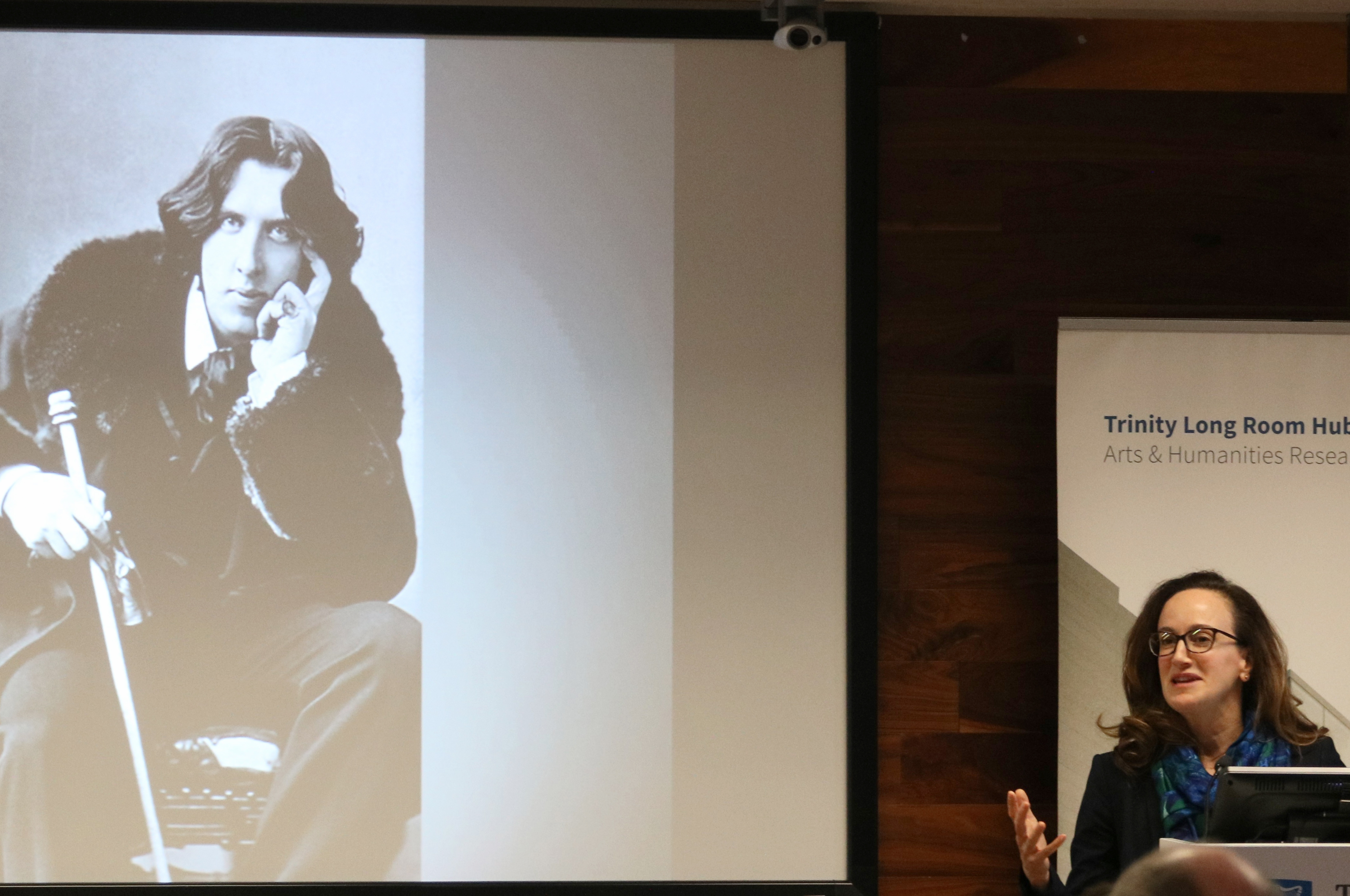
Last night in the Trinity Long Room Hub, Dr Michèle Mendelssohn spoke to a packed room about the challenges faced by one of Trinity’s most iconic and celebrated graduates: Oscar Wilde. Mendelssohn is a literary critic and cultural historian, and is currently an Associate Professor in the English Faculty of Oxford University. She is also the author of Making Oscar Wilde, which details Wilde’s transformation from, in Mendelssohn’s own words, an “academically successful but socially unremarkable” classics student to the witty cultural icon that he is remembered as today. The lecture, entitled “Oscar Wilde: Irish Eccentric to Global Icon”, explored Wilde’s early career and his rise to fame, particularly how he transitioned from being an object of ridicule early in his career to one of the greats of English literature.
Introductory words were given by Vice Provost Chris Morash as well as Laura Shanahan, Head of Research Collections here in Trinity. Both sang their praises of Mendelssohn’s book. Shanahan mentioned that over four decades’ worth of archives from Wilde’s life are now available online for free – “The golden age of the archive has arrived,” Mendelssohn quipped.
Mendelssohn then took to the stage where she spoke passionately about the research that went into Making Oscar Wilde, and the discoveries she made while writing the book.
Wilde’s talent didn’t appear out of thin air. Mendelssohn made a point of emphasising Wilde’s “two extraordinary parents” – his father, Sir William Wilde, was an ear and eye surgeon, while his mother, Jane Wilde, wrote poems under the name “Speranza” and was a devout Irish nationalist. Being born to two such highly intellectual parents definitely placed Wilde at an advantage – his unconventional mother in particular was an enduring, encouraging force throughout his life.
Mendelssohn described the many surprises she encountered along the way as “jack-in-the-box moments”. One such a surprise was the fact that Wilde’s legendary wit, as well as his talents for writing and oratory, were developed and learned during his 1882 lecture tour of America.
At first, Wilde proved to be very popular among the women in America, and he developed a reputation as something of a womaniser. Men, on the other hand, generally disliked him and believed him to be “perverting” their wives. What’s more, his lectures were too serious, and his delivery was, apparently, awful.
Much to his dismay, Wilde became an object of ridicule in American society, and was parodied in racist minstrel shows which were the top entertainment of the day. This mockery stemmed from the belief that the Irish were essentially the same as black people, both inferior to the Anglo-Saxon ideal that dominated America during this time. Racist caricatures of Wilde appeared in magazines, which can be found in the archives that are now available online.
At the behest of his mother, and with help from some of the greats in American show business, Wilde eventually improved his speech-writing and speaking abilities, becoming the charismatic and charming figure he is fondly remembered as today.
Wilde eventually stole the spotlight away from his critics and those who mocked him, and went on to thoroughly criticise the “fake” culture of mockery. By the end of his tour, he was captivating audiences with the originality and sincerity of his lectures. On his return to England, Wilde had a newfound confidence in his abilities and proceeded to re-invigorate the English theatre and literary scene.
“Today”, Mendelssohn smiled, “Oscar is having the last laugh”. With Making Oscar Wilde, Mendelssohn has managed to shine a light on a fascinating period of Wilde’s life. Despite the criticism, mockery and anti-Irish sentiment he faced early on in his career, Wilde was able to overcome adversity and become one of the most celebrated literary figures of all time, making him an iconic inspiration for eccentrics the world over. Perhaps Wilde said it best himself: “Be yourself, everyone else is already taken.”






